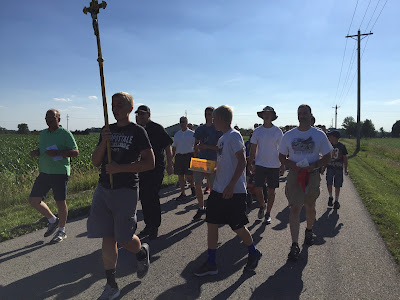 |
| Father Jacques Hamel, pray for us! |
As I think everyone is aware, last week,
a Catholic priest was murdered in France,
while he was offering the Holy Mass.
In fact, he was martyred – at least, that is my own opinion.
His name is Father Jacques Hamel. May he pray for us!
I know this is disturbing; but remember,
this is what has been happening in Iraq, and Syria, in Egypt and Turkey,
and many other places,
where Christianity has existed almost from the beginning.
But those places seem so far away;
we don’t expect this to happen in France.
Let’s remember who the true author of persecution of the Faith is.
It is the devil; and if we are faithful Christians,
he hates us every bit as much as he does those
Christians who are driven from their homes in Iraq or in Africa.
Let me say that again: if you and I are faithful,
we face the exact same hatred and opposition
that comes to those who are being martyred
in so many places around the world.
So that raises a question:
What price are you and I prepared to pay,
for the love of Jesus Christ?
Father Hamel paid with his life; but the truth is,
most of us aren’t going to face that.
You and I are likely to face rather different choices.
Two years ago, as you may recall,
Brendon Eich, the CEO of Mozilla – a computer software company –
was forced to resign from the leadership of that company –
which he founded, by the way! –
because he had donated money
to a referendum defining marriage as a man and a woman.
Now, I don’t know anything about Mr. Eich’s faith, but here’s the point.
If someone who is rich and powerful
like Mr. Eich can be forced out of his job,
what do you think is likely to happen to the rest of us?
In the state of Washington, the governor imposed a rule
that if you operate a drug store, you must – must! –
distribute the so-called “morning after pill.”
While its supporters claim it’s merely a contraceptive,
a lot of people are concerned that it may induce an abortion.
Several pharmacists sued, simply asking that they be able to opt out
and not be made to cooperate with this.
Their case went all the way to the U.S. Supreme Court. They lost.
So now their choice is: either do what they believe is wrong,
or else stop being pharmacists.
Are you and I prepared to see the loss of a promotion,
or a job, or a career, as the price we pay for the love of Jesus Christ?
If you speak up about the
you may be called some names. You may lose a friendship.
Let me say something to our students.
Many of you will go off to college,
either in a few weeks, or in the next few years.
This community, the environment here,
shelters us from a lot of ugliness.
Some of you are in for a shock when you get to college.
Not only will you be in situations
where most people around you aren’t Catholic,
but quite a lot of the Catholics around you
won’t be very tuned into their Faith.
A lot of the built-in supports that you experience here,
a lot of which you may not even be aware of, will be gone.
I’m not trying to scare you; and I’m not saying you can’t handle it.
What I am saying is, that in those moments,
you’ll start paying a price
for the love of Jesus Christ, and it may take you by surprise.
There will be people around you
who won’t be able to stand up to it.
Can you bear that scorn and rejection,
as the price you will pay for Christ?
Don’t be overwhelmed. Be encouraged!
When someone gets up in your face, when someone spits at you,
or turns his back on you, for what you believe,
and when the shock passes, something wonderful happens.
Actually, several wonderful things happen.
First, you realize: I’m stronger than I thought.
Second, you look around, and there will be people with you.
It may not be very many, but it doesn’t have to be many.
Just one other person will give you great courage.
Third, you will feel a spiritual power unlike anything you’ve ever known.
You will know it isn’t your strength, but the strength of Jesus Christ.
And you will, in that moment, understand exactly
How martyrs have such superhuman courage and peace. You’ll feel it.
And, finally, you’ll remember what Jesus said
about being close to those who are maligned and attacked for his sake.
You’ll feel Jesus right there.
And nothing in this world means anything compared to that.
Most of us will never be martyrs like Father Hamel,
but every one of us can expect to pay some price
for being faithful to Jesus Christ.
And consider this: how is it that Father Hamel
Faced his martyrdom with courage and grace?
One answer is that it is supernatural grace, and that’s true.
However, there’s more to it than that.
The great and costly decisions in life
are prepared for by small and boring ones.
My parents never gave their lives for me all at once.
Instead, they gave their lives for my brothers and sisters and me,
little by little, day by day.
I have yet to be faced with martyrdom,
but every day I am faced with the decision to get up, pray,
give myself to others as I meet them hour by hour,
and be faithful to the Lord and to his people.
And it’s exactly the same for you.
So I ask you again: what price are you prepared to pay,
for the love of Jesus Christ?
* I made this change after the 5 pm Mass.







